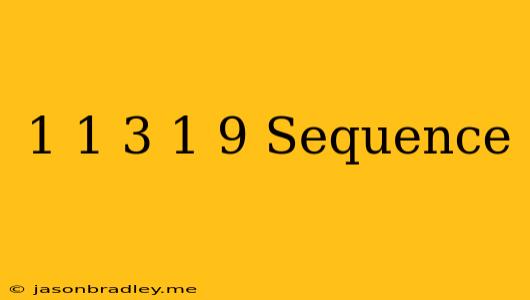The Curious Case of the 1 1/3 1/9 Sequence
The sequence 1, 1/3, 1/9... might seem simple at first glance, but it hides some interesting mathematical properties and connections to other concepts. Let's explore this sequence and uncover its secrets.
Recognizing the Pattern
The most obvious characteristic of this sequence is its geometric progression. Each term is obtained by multiplying the previous term by 1/3. This constant ratio is what defines a geometric sequence.
Finding the nth Term
To find the nth term of this sequence, we can use the formula for geometric sequences:
a<sub>n</sub> = a<sub>1</sub> * r<sup>n-1</sup>
Where:
- a<sub>n</sub> is the nth term
- a<sub>1</sub> is the first term (1 in this case)
- r is the common ratio (1/3 in this case)
- n is the term number
Therefore, the nth term of this sequence is: a<sub>n</sub> = 1 * (1/3)<sup>n-1</sup> = (1/3)<sup>n-1</sup>
Infinite Geometric Series
This sequence is also closely related to infinite geometric series. An infinite geometric series is the sum of an infinite number of terms in a geometric sequence. For this specific sequence, the infinite geometric series is:
1 + 1/3 + 1/9 + 1/27 + ...
This series has a special property: it converges to a finite value. This is because the common ratio (1/3) is less than 1. The sum of this infinite geometric series is:
S = a<sub>1</sub> / (1 - r) = 1 / (1 - 1/3) = 3/2
Applications
This sequence and its associated infinite geometric series have various applications in different fields:
- Physics: This sequence can model the decay of radioactive substances.
- Finance: It can be used to calculate the present value of future cash flows in discounted cash flow analysis.
- Computer science: The concept of geometric series is fundamental to understanding the complexity of algorithms.
In Conclusion
The seemingly simple 1, 1/3, 1/9... sequence reveals fascinating mathematical connections and has practical applications in various fields. Its geometric progression, convergence to a finite value in its infinite series, and its relation to other mathematical concepts make it a captivating example of the power and beauty of mathematics.
